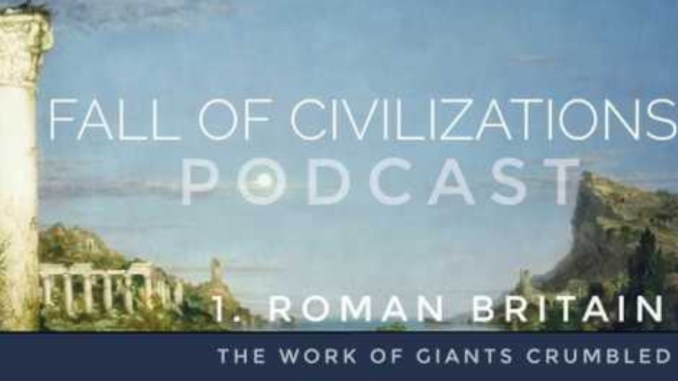
I’m continuing to brush up on British history.
In this podcast, we learn about how Roman civilization collapsed and vanished in Britain between 300 and 500 AD. A key cause were the civil wars in which British governors would march on Rome with all of their troops to challenge Roman emperors for control of the Western Empire. In the process, Britannia would be left defenseless against Picts, Scots and Saxon invaders. This was going on for centuries before the final collapse of Roman authority in 410 AD.
As the barbarian invasions mounted on the continent, the Romans cut their losses, pulled out of Britain and left the Britons to fend for themselves. Trade links with the Roman world were severed. Soldiers and administrators were no longer paid. The economy of Roman Britain collapsed and never recovered. Society became more militarized. The Saxons were invited to Britain by Vortigern and given land in Kent to fight off the Scots and Picts. The rest is history.
The great cities built by the Romans like Londinium (London) and Eboracum (York) crumbled and were abandoned. The Saxons tended to settle outside the ruins of the old Roman cities which they believed were cursed and haunted by ghosts. The ruins of old London were only reoccupied centuries later in King Alfred’s time during the Viking invasions.

One of the Roman authors of the first century AD wrote that Rome had ceased to be a Roman city. It had become a city of Persians and jews with Romans moving to the countryside. Sounds a lot like current USA.
I’d like to know if that internal rot spread to the provinces and led to the weakening and eventual disintegration of the empire.
Arian,
According to what I have been taught the Roman Empire was destroyed by German barbarians —the Vandals, Goths, Franks etc. They were integrated within the Army and society and took over. Especially in the Western part of the Empire. The Eastern Romans got rid of their Germans for the most part by the early 5th century. The Fall of the Roman Empire by Arthur Ferrell explains this.
So the lessons learned are—-do not rely upon others to do your fighting. And do not rely upon tribute/bribery to keep from being invaded. Stay strong. Without force of arms nothing else matters.
Those who say the Romans fell due to degeneracy are wrong. The Romans had adopted Christianity as the official State religion by the late 4th Century because of Emperor Theodosius. So they were Catholic when they fell in 476 A.D. By that time homosexuality and gladitorial games had fallen in disgrace.
When you have barbarians on all sides then you either become a Sparta or a Prussia or you fall apart like a house of cards.
Cristina ROMANA Alva. H (Christy)
Sparta and Prussia lasted a fraction of Rome’s life span.. And we still have Rome even today, different but pretty much alive
Barbarians were used in the army since the early Republican era. It’s good politics. It’s not possible to kill everyone.
Rome began as an insignificant shithole, the astonishing fact is how the hell they built they greatest empire ever and lasted so long
The problems started still in the 2sd century when Rome stopped the expansion, so no more lootings, no more slaves.
Too many wars, unfunded liabilities, too much going and too little coming.
Luckily most of the emperors were excellent administrators.
The reasons for the collapse are many and complex, the most important is the economic collapse. Western Europe was a miserable hellhole, a financial drain to the resources extracted from the East.
The Western Empire collapsed on itself, Germans just wanted to be Romans, the problem was barbarism, stupidity, and the absolute lack of knowledge in how to manage cities with ten of thousands of inhabitants. How to feed them, after you eat the production and kill the living stock? Germanics had only a very rudimentar agriculture.
I blame Germanic stupidity for being unable to even copy Rome’s technologies.
If we want to blame a tribe it was the Huns, who caused a series of leaks in the chain
The Germanic tribes were driven off their land escaping hunger and the Huns
The empire in the West was doomed since the II century.
Nemo,
Nice to hear from you. Thank you for such a detailed response.
The barbarians you mentioned in the early Roman armies were generally auxilliaries not main line soldiers and therefore not the most effective soldiers in the Roman armies.
However after the Battle of Adrianopolis in 378 AD, the Barbarian Cavalry became the most effective units in the new Roman Army.
The Huns you mentioned did drive the Germans (Goths/Vandals etc.) into collision with the Romans. The Huns however did not last long. When the Romans won the battle of Chalons in 453/454 A.D. the Huns retreated. Attila the King of the Huns died of excess on his wedding night.——–No not excess of loving but of drinking.
When Attila the Hun died the Germans defeated the Huns and their empire quickly collapsed.
The Eastern Empire benefited from having a higher portion of native Romans in their Army and because of the extremely powerful walls of Constantinople.
The rest you wrote is something I will have to study.
I agree Rome lasted so long because of their organization, infrastructure, and army discipline. I might add that the Eastern Roman Empire adopted heavy armored cavalry with horse archers in combination with infantry. In short the Romans were innovative and usually flexible.
Cristina ROMANA Alva. H (Christy)
I’m a Veneti, the Veneti were one the first allies of the Romans in Northern Italy, since the 3rd century BC
They contributed around 15.000 troops for the Battle of Telamon in 225 BC against the Celts for example, not only as auxiliaries but joined also the legions. the Veneti were present in the war against Hannibal inside Italy, and in the destruction of Carthage and so on.
The biggest reason Rome fell? so obvious that it’s pretty strange that so few mention?
Rome lost its meaning. What in the beginning was a high honor to fight in the legions and die for Rome,
later the Romans saw it as a misfortune, a burden, so much so that many in Rome and Italy inflicted in themselves gruesome mutilations to avoid being conscripted in the legions.
Flavius Aetius, for example, met enormous difficulties to raise 3 legions in Italy to fight Attila in the battle of Chalons.
Hannibal, on the other hand, alone killed more than 120.000 Roman soldiers in a few years, and Rome raised more and more legions to invade Africa and defeat Hannibal in his own soil.and just five years later destroyed the Macedonians. And the population in Italy was smaller at that time.
That was the problem that was absolutely unavoidable. Empires, civilizations, have a life span.
Rome, due to its political and administrative genius, lasted longer than what should be expected
We are seeing that, lost of meaning, lack of will to fight, in the whole of Western Europe right now
If Germanics weren’t so stupid and incompetent they would have become the backbone of a reinvigorated Empire, and the terrible Middle Ages wouldn’t have happened.
That was the goal of many Roman Emperors and Roman bureaucracy, Romanize the Germanics and continue with the highly successful empire.
The only ones that refused the Romanization, one for stupidity the other for wickedness, were the Germanics and Jews. They deserve each other.
The most successful Germanic tribe, was the one more willing to be Romanized, the Franks.
The more stubborn and stupid tribe that refused cooperation was exterminated, the Vandals
Nemo,
Yes since the late 4th century A.D. the Roman armies were full of barbarians who were also the most effective troops in the Empire by that time. I had read that the native Romans did not seem interested in fighting anymore. Part of the reason might be that the Roman citizenship was no longer primarily latin and Italian but that Rome had become cosmopolitan since citizenship was given to all free inhabitants of the Empire around 200 A.D.
So being Roman had become like being a modern American—just about any warm body qualified for citizenship.
Also, as far as I am aware the Germans were not brutal rulers once they settled down. The Ostrogoths who ruled Italy until the Easterm Empire reconquered Italy were benevolent rulers to the best of my knowledge.
The Visigoth rule in Spain was not considered harsh by Spanish historians either. Naturally, I am judging what is and is not brutal by the standards of the time.
The Vandals have an ominous name but I wonder if they were cruel rulers are merely mass looters.
I do find Roman history fascinating. European History is my favorite subject along with Geography. But Geography was only taught in Primary School.
However, with history comes a knowledge of Geography as well.
This entire podcast series is quite good, and I believe is up to the 7th or 8th installment now. The narrator, (Paul Cooper, I think is his name), does an extremely fantastic job of putting together the facts surrounding the rise and fall of various cultures. Easter Island, Mayans, Khmer empire in Cambodia, etc.
I’ve listened to all of them. Of course, he puts the standard liberal spin on much of it, especially with the fall of Native American tribes. I’d still give the production value a 9.5/10
The fun part here is that Britannia appears to have been too expensive for the Romans to occupy it was a net liability for the borg over several hundred years of bubbling rebellions and coups
Not sure if you’ve seen/listened to this, but given your present interests, it’s right up your alley.
The Anglo-Saxon World, a series of 14 lectures by Michael Drout, professor of Medieval history at Wheaton College, produced by The Modern Scholar company. He also has a similar series produced by the same company called The Norsemen. His university homepage (http://mdrout.webspace.wheatoncollege.edu) hosts his recordings of Anglo-Saxon literature read out loud – it’s interesting to hear how Anglo-Saxon sounds (very different!).
Check this out:
https://www.thegreatcoursesplus.com/category/history
Neither Caesar nor Hitler nor Napoleon were able to conquer Britain. But those beady-eyed, hook-nosed tapeworms from the Middle East have.
Hitler might have invaded and conquered cuck island, but by the fall of 1940, weather conditions for amphibious landings didn’t allow it. Yet another example in how weather and climate played a deciding factor in WWII in Europe.
For those interested in the historical aspects of the European race, we “Who We Are” by William Luther Pierce. You can find PDF versions on the web. I strongly suggest you read his history before you saturate your brains further with mainstream historians and their associated videos; it will at least give you critical pause where needed.
If you look at a Mao it’s obvious why the Roman Empire fell apart it was just tooooo big
I’m not sure why my post from a couple of days ago didn’t pass muster?
I complimented the value of this podcast series (notably that it covers a variety of ancient civilizations, and is quite detailed and educational).
After all, we can learn just as much from Asian, Native American, and African history as we can learn from European. (In the grand scheme of things).
Highly recommend this guy’s work. I believe his name is Paul Cooper and he’s on Twitter too.
Deo Vindice
Maybe it got stuck in the filter. I will check.
I listened to the whole damn thing. It reminds of an illustrated history of Britain I read when I was a kid. The book was written in 1930’s or before and had been gathering dust on the library shelf before I discovered it. The illustrations were all hand drawn, and a lot of it was tongue in cheek humor and sarcasm.